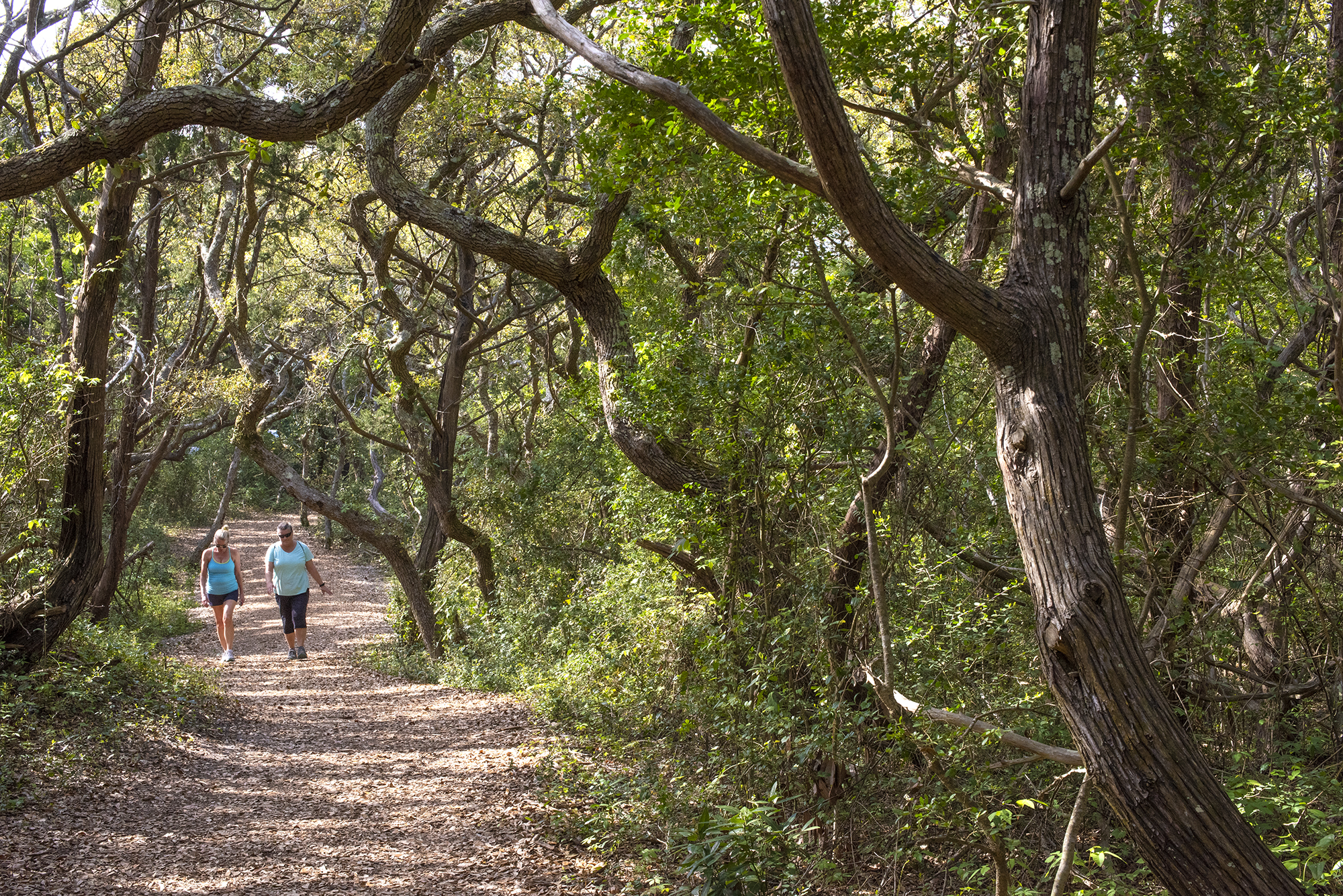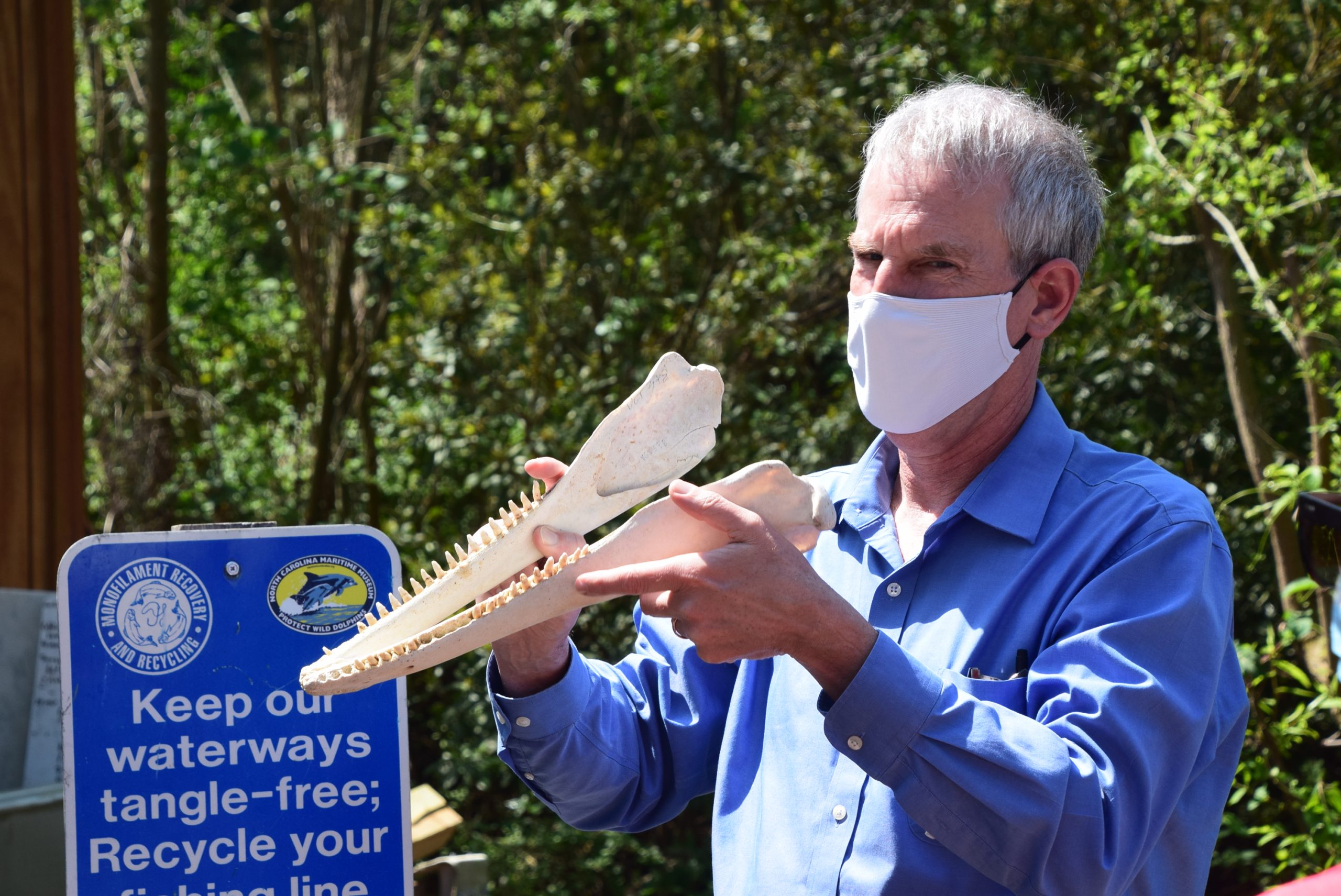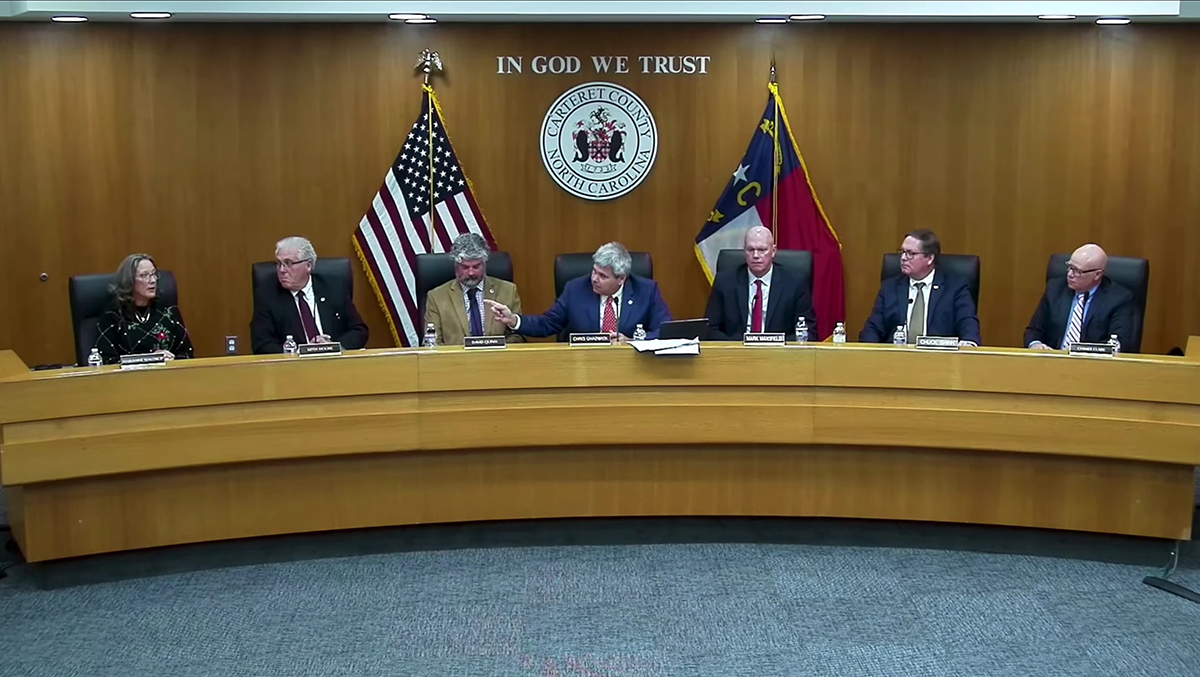
BEAUFORT – Reid Wilson stood with about a dozen others at the back entrance of the Bonehenge Whale Center while director Keith Rittmaster held up the jaw of a bottlenose dolphin.
Wilson, secretary of the state Department of Natural and Cultural Resources, was on a private tour April 9 that began that morning at the North Carolina Maritime Museum and was followed by the visit to Bonehenge, which is focused on the conservation and education of whales, dolphins and porpoises. Bonehenge is affiliated with the museum and located at Gallants Channel annex site, the planned future home of the museum’s extended campus.
Supporter Spotlight
“This is kind of a fun thing,” said Rittmaster, explaining that dolphins do most of their hearing through their lower jaws, which are hollow and filled with what’s called acoustic fat that transmits sound.
Rittmaster, who is also natural science curator for the North Carolina Maritime Museum in Beaufort, handed the jaw to Wilson, encouraging him to hold the jaw up to his ear and scratch against the hollow bone, while pointing out that it functions like a hearing aid.

Wilson became secretary Jan. 1, but it’s been a few years since he joined the agency that oversees the maritime museum and six other history museums as well as 27 historic sites, two art museums, two science museums, three aquariums, Jennette’s Pier, 39 state parks and recreation areas, and the state’s zoo, symphony, library, archives, arts council, preservation office, Office of State Archaeology, the African American Heritage Commission and the Office of Land and Water Stewardship.
Wilson served from 2017 until last year as the department’s chief deputy secretary, responsible for the agency’s natural resource divisions. Before joining the department, he was Conservation Trust for North Carolina executive director, a statewide nonprofit that advances land conservation by protecting lands along the Blue Ridge Parkway, assisting 24 local land trust organizations.
His visit to Beaufort was part of tour of some of the department’s sites in coastal counties, including Hammocks Beach State Park in Swansboro, Tryon Palace in New Bern, the North Carolina Aquarium at Pine Knoll Shores and Fort Macon State Park in Atlantic Beach.
Supporter Spotlight
Wilson explained to a small crowd at the museum the department’s often overlapping priorities: education; public health; diversity, equity and inclusion; economic development; and climate change and resiliency.
He said the department encompasses numerous things that people love about the state. Whether it’s the state’s rich history, or diverse arts and culture or protecting the natural areas, these resources provide a sense of shared identity.
“We provide literally common ground for folks, whether it’s on a path in a state park, or on the exhibit floor here, everyone there’s treated the same, everyone’s welcome,” and these days finding common ground these is especially important, Wilson said.
“We provide literally common ground for folks, whether it’s on a path in a state park, or on the exhibit floor here, everyone there’s treated the same, everyone’s welcome.”
Reid Wilson
The education component used to include mainly school groups visiting sites before the COVID-19 pandemic, and will again, but in the meantime, the department “does incredible things to connect to kids, families and teachers all over the state,” Wilson said. These efforts include making all educational materials – about 1,500 pieces — available online.
The department’s public health priority overlapped with its education efforts during the past year like never before.
“We’ve all seen in the pandemic how important our parks and trails and greenways are to people’s sanity and physical health,” Wilson said. The department is trying to secure more funding from the legislature to expand state parks and trails as well as trails operated by local governments and historic sites, “because people need that outdoor exercise these days more than ever.”
Wilson said that since the COVID-19 pandemic began, state parks and trails have seen surging numbers, even though most were closed for weeks.
“In 2020, we had record visitation, 19.8 million people. And I think it’s clear to everybody that — especially in a pandemic — one of the best things you can do for your health, other than getting vaccinated and following the three Ws (Wear a mask, Wait 6 feet apart, Wash your hands), is get outside for exercise, it’s good for your mind good for your body, and the governor’s budget includes additional funding for parks and trails, so that we can meet that demand,” he said.
Public health also factors into the Land and Water Conservation Fund, which buys land along streams, restores wetlands and funds water quality protection and improvement projects by local governments and conservation groups.
“Everybody needs good water quality to be a healthy person, whether you’re swimming in it, fishing in it, or drinking it,” he said.
He told Coastal Review that the Land and Water Fund grants are an important tool. Improving water quality “is essential to our public health — you can’t be healthy without good water. And that’s true whether you’re drinking or swimming or fishing.”
Diversity, equity and inclusion have also become increasingly critical issues, Wilson said.
“This is really important that our department — the only department that has the word cultural in it — reflects our diverse culture in the state and tells a wide variety stories of the people who lived here long ago and live here today,” he said. Across the department, there are opportunities to feature and tell stories not told before.
While there are many sites around the state that help communities be a little bit stronger economically, the department, under its economic development efforts, awards grants to communities, parks, libraries, arts councils and science museums.
“All that support helps make those institutions strong and thriving and important vital elements of those communities,” he said.
Historic preservation is also a big part of the economy in towns like Beaufort, adding to the community’s character and luring visitors.
All these assets are at risk from the effects of climate change, and Wilson said he wants his department to be an objective, trusted source of information about climate change.
“And I want us to work with local communities to help them plan to be more resilient to future storms, and weather events related to climate change. So, we’re going to do that work too,” he said.
Wilson said his department has the expertise on climate change at aquariums, science museums and zoos.
“I want us to be a leader in science-based climate change education throughout the state. I want us to be teaching about climate change at all of our sites around the state — We have about 80 sites,” he told Coastal Review. “The information would be very objective about what causes climate change, what are the effects, what can a family do about it to reduce their own carbon footprint, what can governments do about it, because you know it’s an existential issue. I want to our department to lead on it in, in conjunction with the governor’s Executive Order 80.”
Resiliency ties into the department’s priorities in a couple ways, he added.
“Our Historic Preservation Office can help local communities plan how they preserve their historic spaces in a way that is more resilient to future floods and storms. In addition, we have state archives office that helps communities figure out how to preserve their records, so they don’t to get flooded out.







